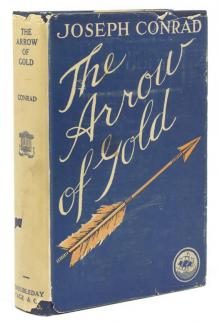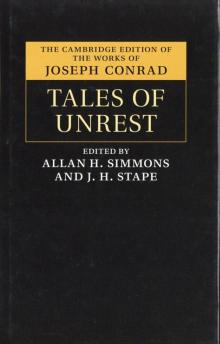- Home
- Joseph Conrad
The Brute Page 3
The Brute Read online
Page 3
"It was said that one of the firm had been heard once to express a hope that this brute of a ship would get lost soon. I can hardly credit the tale, unless it might have been Mr. Alfred Apse, whom the family didn't think much of. They had him in the office, but he was considered a bad egg altogether, always flying off to race meetings and coming home drunk. You would have thought that a ship so full of deadly tricks would run herself ashore some day out of sheer cussedness. But not she! She was going to last for ever. She had a nose to keep off the bottom."
Jermyn made a grunt of approval.
"A ship after a pilot's own heart, eh?" jeered the man in tweeds. "Well, Wilmot managed it. He was the man for it, but even he, perhaps, couldn't have done the trick without that green-eyed governess, or nurse, or whatever she was to the children of Mr. and Mrs. Pamphilius.
"Those people were passengers in her from Port Adelaide to the Cape. Well, the ship went out and anchored outside for the day. The skipper—hospitable soul—had a lot of guests from town to a farewell lunch—as usual with him. It was five in the evening before the last shore boat left the side, and the weather looked ugly and dark in the gulf. There was no reason for him to get under way. However, as he had told everybody he was going that day, he imagined it was proper to do so anyhow. But as he had no mind after all these festivities to tackle the straits in the dark, with a scant wind, he gave orders to keep the ship under lower topsails and foresail as close as she would lie, dodging along the land till the morning. Then he sought his virtuous couch. The mate was on deck, having his face washed very clean with hard rain squalls. Wilmot relieved him at midnight.
"The Apse Family had, as you observed, a house on her poop. . . ."
"A big, ugly white thing, sticking up," Jermyn murmured sadly, at the fire. "That's it: a companion for the cabin stairs and a sort of chart-room combined. The rain drove in gusts on the sleepy Wilmot. The ship was then surging slowly to the southward, close hauled, with the coast within three miles or so to windward. There was nothing to look out for in that part of the gulf, and Wilmot went round to dodge the squalls under the lee of that chart-room, whose door on that side was open. The night was black, like a barrel of coal-tar. And then he heard a woman's voice whispering to him.
"That confounded green-eyed girl of the Pamphilius people had put the kids to bed a long time ago, of course, but it seems couldn't get to sleep herself. She heard eight bells struck, and the chief mate come below to turn in. She waited a bit, then got into her dressing-gown and stole across the empty saloon and up the stairs into the chart-room. She sat down on the settee near the open door to cool herself, I daresay.
"I suppose when she whispered to Wilmot it was as if somebody had struck a match in the fellow's brain. I don't know how it was they had got so very thick. I fancy he had met her ashore a few times before. I couldn't make it out, because, when telling the story, Wilmot would break off to swear something awful at every second word. We had met on the quay in Sydney, and he had an apron of sacking up to his chin, a big whip in his hand. A wagon-driver. Glad to do anything not to starve. That's what he had come down to.
"However, there he was, with his head inside the door, on the girl's shoulder as likely as not—
officer of the watch! The helmsman, on giving his evidence afterwards, said that he shouted several times that the binnacle lamp had gone out. It didn't matter to him, because his orders were to 'sail her close.' 'I thought it funny,' he said, 'that the ship should keep on falling off in squalls, but I luffed her up every time as close as I was able. It was so dark I couldn't see my hand before my face, and the rain came in bucketsful on my head.'
"The truth was that at every squall the wind hauled aft a little, till gradually the ship came to be heading straight for the coast, without a single soul in her being aware of it. Wilmot himself confessed that he had not been near the standard compass for an hour. He might well have confessed! The first thing he knew was the man on the look-out shouting blue murder forward there.
"He tore his neck free, he says, and yelled back at him: 'What do you say?'
" 'I think I hear breakers ahead, sir,' howled the man and came rushing aft with the rest of the watch, in the 'awfullest blinding deluge that ever fell from the sky,' Wilmot says. For a second or so he was so scared and bewildered that he could not remember on which side of the gulf the ship was. He wasn't a good officer, but he was a seaman all the same. He pulled himself together in a second, and the right orders sprang to his lips without thinking. They were to hard up with the helm and shiver the main and mizzen-topsails.
"It seems that the sails actually fluttered. He couldn't see them, but he heard them raffling and banging above his head. 'No use! She was too slow in going off,' he went on, his dirty face twitching, and the damn'd carter's whip shaking in his hand. 'She seemed to stick fast.' And then the flutter of the canvas above his head ceased. At this critical moment the wind hauled aft again with a gust, filling the sails, and sending the ship with a great way upon the rocks on her lee bow.
She had overreached herself in her last little game. Her time had come— the hour, the man, the black night, the treacherous gust of wind—the right woman to put an end to her. The brute deserved nothing better. Strange are the instruments of Providence. There's a sort of poetical justice—"
The man in tweeds looked hard at me.
"The first ledge she went over stripped the false keel off her. Rip! The skipper, rushing out of his berth, found a crazy woman, in a red flannel dressing-gown, flying round and round the cuddy, screeching like a cockatoo.
"The next bump knocked her clean under the cabin table. It also started the stern-post and carried away the rudder, and then that brute ran up a shelving, rocky shore, tearing her bottom out, till she stopped short, and the foremast dropped over the bows like a gangway."
"Anybody lost?" I asked.
"No one, unless that fellow Wilmot," answered the gentleman, unknown to Miss Blank, looking round for his cap. "And his case was worse than drowning for a man. Everybody got ashore all right. Gale didn't come on till next day, dead from the West, and broke up that brute in a surprisingly short time. It was as though she had been rotten at heart." . . He changed his tone.
"Rain left off. I must get my bike and rush home to dinner. I live in Herne Bay—came out for a spin this morning."
He nodded at me in a friendly way, and went out with a swagger.
"Do you know who he is, Jermyn?" I asked.
The North Sea pilot shook his head, dismally. "Fancy losing a ship in that silly fashion! Oh dear! oh dear!" he groaned in lugubrious tones, spreading his damp handkerchief again like a curtain before the glowing grate.
On going out I exchanged a glance and a smile (strictly proper) with the respectable Miss Blank, barmaid of the Three Crows.

 Heart of Darkness
Heart of Darkness Lord Jim
Lord Jim The Nigger of the Narcissus (Echo Library)
The Nigger of the Narcissus (Echo Library) Victory (Dover Thrift Editions)
Victory (Dover Thrift Editions) Secret Agent
Secret Agent Nostromo
Nostromo Chance: A Tale in Two Parts
Chance: A Tale in Two Parts Youth
Youth Almayer's Folly
Almayer's Folly The Heart of Darkness and the Secret Sharer
The Heart of Darkness and the Secret Sharer The Arrow of Gold: A Story Between Two Notes
The Arrow of Gold: A Story Between Two Notes The Rescue: A Romance of the Shallows
The Rescue: A Romance of the Shallows The Point Of Honor: A Military Tale
The Point Of Honor: A Military Tale Tales of Unrest
Tales of Unrest Under Western Eyes
Under Western Eyes Gaspar Ruiz
Gaspar Ruiz A Set of Six
A Set of Six Heart of Darkness and the Congo Diary (Penguin Classics)
Heart of Darkness and the Congo Diary (Penguin Classics) Heart of Darkness and Selected Short Fiction
Heart of Darkness and Selected Short Fiction Typhoon
Typhoon Youth, a Narrative
Youth, a Narrative Tomorrow
Tomorrow The Arrow of Gold
The Arrow of Gold The Shadow Line: A Confession
The Shadow Line: A Confession The Rescue
The Rescue Victory (Echo Library)
Victory (Echo Library) The Brute
The Brute Romance
Romance A Personal Record
A Personal Record Lord Jim: A Tale
Lord Jim: A Tale Heart of Darkness and Selected Short Fiction (Barnes & Noble Classics Series)
Heart of Darkness and Selected Short Fiction (Barnes & Noble Classics Series) Within the Tides
Within the Tides The Secret Sharer and Other Stories
The Secret Sharer and Other Stories Falk
Falk Heart of Darkness and The Secret Sharer
Heart of Darkness and The Secret Sharer Chance
Chance An Anarchist
An Anarchist The Secret Agent: A Simple Tale
The Secret Agent: A Simple Tale The Secret Agent
The Secret Agent Complete Works of Joseph Conrad (Illustrated)
Complete Works of Joseph Conrad (Illustrated) Heart of Darkness and the Congo Diary
Heart of Darkness and the Congo Diary Notes on Life & Letters
Notes on Life & Letters Typhoon (Single Story)
Typhoon (Single Story)